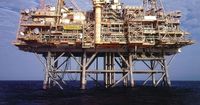Pakistan and Turkey are set to embark on a significant collaboration aimed at exploring and extracting newly discovered offshore oil and gas reserves in Pakistani waters. This partnership, highlighted by the American website Oil Price, marks a strategic agreement between the two nations, which is believed to involve the fourth largest oil and gas reserve globally, according to Arabi21.
The agreement was reached during the Pakistan Minerals Investment Forum 2025 held in Islamabad, where both countries expressed their commitment to a joint venture for the exploration of 40 offshore blocks. The Pakistani government had previously announced in February its intention to offer exploration concessions for these blocks, located in the Makran and Sindh basins.
Participating in this joint venture are notable companies such as Mari Energy Limited, Oil and Gas Development Company Limited, and Pakistan Oil Limited, alongside the Turkish state-owned company Trolley Anonymous Şirketi. This collaboration highlights the growing economic ties between Pakistan and Turkey, particularly in the energy sector.
According to Modern Diplomacy, the discovery of these reserves is a result of three years of extensive exploration and is expected to have a profound impact on Pakistan's economic landscape. Currently, one in every four people in Pakistan lives below the poverty line, and the potential economic benefits from these reserves could be transformative.
However, the question arises: why have major oil companies not previously pressured the Pakistani government to tap into these resources? An article published in January 2024 by Oil Price noted that Shell had sold its stake in its Pakistani operations to Saudi Aramco in June 2023, and that an auction for 18 oil and gas blocks received little interest from international bidders. Notably, no international companies applied for 15 of these blocks, as reported by The Nation.
Pakistani Minister of Petroleum Musaddaq Malik revealed in July 2024 that international companies have shown a lack of interest in exploring oil and gas in Pakistani waters. He attributed this to security concerns and the high costs associated with ensuring the safety of personnel and assets. "Companies looking for oil and gas in certain areas need to spend significant amounts to maintain the security of their staff and assets," Malik stated, emphasizing that the security provided by Pakistan has not met the required standards.
Security issues have been a significant deterrent for foreign investment in Pakistan's energy sector. In March 2024, five Chinese engineers were killed in a terrorist attack in northeastern Pakistan, highlighting the ongoing risks in the region. This incident occurred when a vehicle laden with explosives struck a bus transporting employees from Islamabad to the Dasu Dam project, part of the $62 billion China-Pakistan Economic Corridor. Such attacks have led to temporary shutdowns across various projects.
In addition to oil and gas, Pakistan's offshore areas are rich in natural resources, including minerals such as cobalt, nickel, and rare earth elements. This wealth of resources presents an opportunity for the country to tap into the "marine economy," as noted by Modern Diplomacy. The potential benefits extend beyond energy, encompassing sectors like marine biotechnology and even eco-tourism.
Despite lacking the technological capabilities for deep-sea mining, global interest in this field is growing, with some companies exploring opportunities for multi-metal mining contracts. The Pakistani energy minister, Muhammad Ali, indicated that Pakistan possesses 235 trillion cubic feet of gas reserves, suggesting that an investment of $25 to $30 billion could be sufficient to extract 10% of these reserves over the next decade. This would be essential to reversing the current decline in gas production and reducing reliance on energy imports.
In a related development, three international oil companies—Shell, Chevron, and Mubadala—have withdrawn from gas exploration areas in the Red Sea off the coast of Egypt. According to a government official speaking to Al-Sharq, these companies informed the Egyptian General Petroleum Corporation that the second phase of seismic survey operations yielded economically unviable results, leading them to cancel planned drilling operations.
The total area of exploration won by these companies in the first international bid for oil and gas exploration in the Red Sea, launched by Egypt in 2019, exceeds 10,000 square kilometers, with a minimum investment of $326 million expected to rise to billions in subsequent stages if discoveries were made. Shell had obtained exploration blocks 3 and 4 in the Red Sea but found the results of its seismic surveys disappointing.
The Egyptian Ministry of Petroleum did not respond to inquiries regarding this withdrawal, but a Shell Egypt official indicated that the company is now focusing on exploration in the Mediterranean region instead. Egypt, the largest Arab country by population, aims to become a regional energy hub and is actively seeking to enhance its gas production.
The Egyptian government has introduced new incentives for foreign companies to boost gas production, including allowing them to export a portion of their new output to cover outstanding debts. Currently, Egypt's daily gas needs amount to 6.2 billion cubic feet, with production at about 4.6 billion cubic feet. The government aims to increase natural gas production to approximately 5 billion cubic feet per day by the end of the year.
As both Pakistan and Egypt navigate their respective challenges in the energy sector, the potential for collaboration and investment in offshore resources remains a focal point for economic growth and stability in the region. The successful extraction of these resources could not only enhance energy security but also provide much-needed economic relief for populations facing poverty and unemployment.





